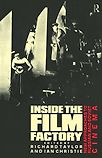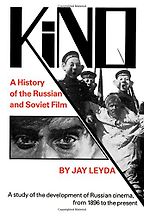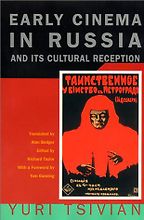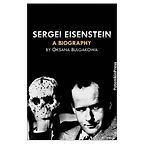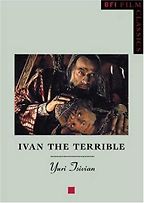In your overview of Russian cinema, your first pick is by Jay Leyda, the author of Kino: A History of the Russian and Soviet Film. Who was Jay Leyda?
Leyda was a young American film enthusiast who, seized by the example of Russian cinema, had this extraordinary idea that he would go to Moscow and sit at the feet of the world’s greatest film maker and theorist: Eisenstein. He wasn’t the only person who had that idea – famously Samuel Beckett thought exactly the same and wrote to Eisenstein, but never got a reply. Leyda did get a reply, and went and studied with Eisenstein at VGIK, the film school, in the early 30s.
He was an intern on Eisenstein’s Bezhin Meadow, and took an extraordinary gallery of photos of the making of that film which are absolutely crucial now, because the film was lost: it was censored, banned, shelved, and then accidentally destroyed during the war. So Leyda knew Soviet cinema from the inside, and he decided in the 50s that he would write a proper history about it.
“Samuel Beckett wrote to Eisenstein, but never got a reply.”
I think the great thing about this book is that, although it was written during the height of the Cold War, it manages to be incredibly sympathetic to different aspects of early Russian cinema. It’s true that Leyda was politically and temperamentally quite sympathetic to the Soviet Union, but it’s not the work of an apologist in any way – it’s the work of a friendly observer. It’s much more about art than politics.
I first read the book in the mid-60s and it became an absolute bible for me – it really was one of those books that shape your life. I read it with great enthusiasm, but there’s a lot I didn’t understand at the time. I didn’t pay any attention to the beginning – which talks about pre-Revolutionary Russian cinema – I just plunged into the 20s. But Kino was the only source on the pre-Revolutionary period for years, until we finally got to see those films in the late 1980s.
There’s a section which Leyda called ‘witnessed years’; there’s a whole different tempo about that, where he’s actually talking about things he saw, and a tremendous feeling of excitement. It’s very scrupulous about what he had and hadn’t seen, and there’s absolutely no attempt to cover things that he gets from secondary sources. It also lets his own opinions hang out – it’s beautifully written, of course, but its sophistication is in making clear where he stands in relation to the material he could and couldn’t get at. Very few histories do that: they flatten things out.
Of course, it has blind spots and weaknesses, but that’s part of its charm and its probity. I think it’s an absolute model. It’s one of those books, and there are just a handful of them, that when you go back to it – I’ve been going back to it for decades now – you always find different things in. They were always there but you never noticed them: and that, I think, is the mark of a truly great book.
Is this the book that opened your eyes to Russian cinema?
Oh completely! It was an absolute vade mecum: I mean you couldn’t orient yourself in relation to Soviet cinema without it. And if you were one of those who grew up with it then it shaped your view, but that’s just how strongly marked one was by the book.
Next on your list is Yuri Tsivian’s book Early Cinema in Russia and its Cultural Reception.
Tsivian had this idea to try to reconstruct the history of early Russian cinema – the stuff that Ledya didn’t deal with, and that all the Soviet avant-garde despised – and to approach it through a deeply contextual history. This is a revolutionary book. It is the first major book in film studies that doesn’t deal with films per se at all, but with the experience of going to the cinema. Why do people go the cinema? How do they feel about going? What happens to them inside the cinema? What do they talk about? There’s even a chapter about things going wrong in the cinema – which I think is absolutely the most original idea: what happened when the film broke?
What sort of answers does he come up with to those questions?
I think what Tsivian shows is that because of the situation in Russia at the time that cinema arrived, reactions were a bit different than elsewhere. There wasn’t the automatic assumption that cinema was only for oiks: the intelligentsia and the newly emerging rich were also fascinated by it. For instance the daughter of a Siberian gold merchant opened a couple of cinemas catering especially for the upper classes. One was called ‘Just like Paris’, with private boxes.
“There wasn’t the automatic assumption that cinema was only for oiks: the intelligentsia and the newly emerging rich were also fascinated by it.”
And although the views of the labouring classes aren’t recorded, you do have a range of high-quality responses to cinema, which shows that it kind of went from top to bottom in Russia. There’s a wonderful chapter on the rise of the foyer, and how important it became as a place to meet your friends.
So cinema in Russia was a social occasion, like an artistic salon in which to discuss your responses to the performance?
Exactly. Not to say that that was the whole response, but the point was that there were some quite distinctive Russian features, and unlike in Britain and elsewhere, where cinema was for the ‘carriage trade’, in Russia it would seem that the middle classes and the affluent were quite attracted to it.
It’s an extraordinary book on the phenomenology of the cinema experience. He uses incredibly varied sources: poets, journalists, writers of all kinds are frisked to get the little asides. He talks about a postcard Alexander Blok sent to someone, saying, ‘I set off to see you yesterday, but I got ambushed by a cinema at the end of the street’ – fantastic! Because it’s one of the greatest documents about the way that cinema caught people, and just drew them in.
It’s a very Soviet-era book really, with a very wry attitude towards theory. And it takes you into the absolute difference of Russian cinema – the fact that early Russian cinema really was a different social and artistic experience. It even felt different from Western cinema, which is why the two didn’t really mix. I think it’s a wonderful book. I do regularly urge people to read it who have no interest in early Russian cinema at all, because it gives them tools to understand cinema in a way that nothing else I know does.
Tell me about Bulgakowa’s Eisenstein biography.
The particular problem with Eisenstein’s life is that he’d already said so much about it. He’s completely dominated all approaches to his life, and provided the best, most attractive and seductive account of it imaginable – all those wonderful chapters and phrases in what he called his ‘immoral memoirs’.
Five Books interviews are expensive to produce. If you're enjoying this interview, please support us by donating a small amount.
Bulgakowa went into the archives and got access to the diaries, which have never been published or made widely available. She used a huge amount of material to provide a kind of corrective view of Eisenstein, and the result is extraordinary – because it just brings you back to the materiality, the everydayness of what life was like. One of the great moments in the book is: how did Eisenstein find out about Freud? Well, he found out about it by reading Leonardo (quite a lot of Freud was available in Russian translation) in 1918 on a tram. He got so excited reading it that he spilt a whole bottle of milk all over himself. This wonderful Freudian moment!
An ‘Eisensteinian’ moment.
An everything moment – like something out of Dr Zhivago. But Eisenstein continued reading – he read the whole thing on that journey. And he went out and read everything he could before Freud was forbidden in 1924. There was a period when Freud was exactly what you would read if you were a keen young disciple of the Revolution. People have forgotten that.
Why would a keen young Soviet be reading Freud?
Freud’s writing I think chimed with what people were interested in in Russia: that funny mixture of quite scientific physiological interest allied to the metaphysics of Freud.
It appealed to Russians’ mystic nature?
Exactly. But then of course there was a suppression of psychoanalysis. I think the neurological institute was transformed or closed down in 1924 and from about then it starts being a forbidden subject. By 1928 it’s a very forbidden subject, and seen as a very bourgeois science and part of bourgeois intellectual terrorism.
And probably suspiciously Jewish?
Yes, that too. So time and time again Bulgakowa’s book takes you to the circumstances of Eisenstein’s life. You finish reading with a fantastically renewed sense of: how did he pack so much in? You see how difficult it was, but also what his appetite was for new experiences.
It took Bulgakowa to reorientate the whole vision of Eisenstein. It’s an extraordinarily important book.
And Tsivian’s Ivan the Terrible book?
What’s interesting about it is that a whole shelf of books has been written about that film, but Tsivian’s approach is very different from anyone else’s: because what he does is to relate it intimately to Eisenstein’s inner life. He posits the film as very much a solution to Eisenstein’s unresolved psychological problems.
He doesn’t ignore the historical fresco that Ivan IV was, or his relation to the course of Russian history, but there’s a lot of emphasis on the way that Eisenstein refigures the available material on Ivan, and turns it into a kind of psycho-autobiography.
Get the weekly Five Books newsletter
A very Freudian film?
It’s a completely Freudian film. How he managed to get away with it at the height of Stalinism is pretty remarkable, although he did pay the price, and the film wasn’t shown until 57, after his death. But, for example, the flashback in Part II to the terrorised boy with his mother being dragged away is Eisenstein reworking the traumatic experiences of his own childhood where in fact he – the opposite – was forced to live with his father when his parents divorced. It’s terribly personal: that image of the terrorised little boy is one of the most naked pieces of picturing and transforming your own trauma that any filmmaker has put on screen.
Tsivian’s good on that, and very very good at reading the minutiae of the film in a truly art historical way – he really takes you into the heart of the points at which Eisenstein turns what could have been a very hollow monumental film into a deeply personal one. It goes very much into the technique, and how Eisenstein personally masterminded the detailed construction of the film: being his own scriptwriter, art director and editor. It really is an astonishingly autographic film, and Tsivian is very good at giving you that sense.
And Turovskaja on Tarkovsky: Cinema as Poetry?
Maja Turovskaja was a contemporary of Tarkovsky’s at VGIK, and she’s of that generation (and we know how important generations were in Russia) that came up through the thaw, and then emerged just at a moment when it was possible to do new things, before being repressed. It’s really a book about the poetics of Tarkovsky’s cinema, and what influenced him and what shapes it.
Does she have a favourite film?
I think the one to focus on is Mirror, because it’s such a complex, layered film, reaching back into the forbidden areas of Russian experience. And the fact that she’s of the same generation meant that she could appreciate that in the same way. She says, ‘It felt like a culmination of all Tarkovsky’s previous work. It had come to fruition deep within him and emerged from the climax and catharsis of all these motifs.’ So she’s just confirming that in quite an eloquent but also in a passionate way.
Do you think the fact that it’s his most deliberately experimental film resonated with her?
Yes, I think that’s absolutely true. What she does say is: yes, it is terribly rooted in his personal, his family experience, and also in the experience of the generation that lived through those events. But she also says it’s always reaching out towards the universal concerns that stand behind them. Turovskaja is immensely sympathetic to what Tarkovsky’s trying to do. She doesn’t necessarily think that he’s as great as people have come to think he is – it doesn’t put him on a pedestal, but really tries to talk about him as a film maker who’s partly produced by a certain unique cultural moment in Russia. He had great freedom and opportunities, which I think people are always forgetting, to create the kind of defiantly artistic cinema that he wanted to.
Get the weekly Five Books newsletter
There was a period when all that people could say in the West was: this poor persecuted man who’s struggled against all the odds, etc – baloney! He didn’t face the problems that many Western filmmakers have to try and realise their vision. Turovskaja understands all that, and helps you understand Tarkovsky from a Russian point of view. It’s mainly about how a Russian member of the intelligentsia sees him, and I think that’s unique. No other person has written about Tarkovsky in that way: her book is a kind of essential companion. She started writing it when Tarkovsky had gone into exile and finished it at the first high tide of perestroika. In fact the last chapter was written just when it was possible to speak about Tarkovsky again, and about the films he made in exile, and that makes it a very exciting book.
Five Books aims to keep its book recommendations and interviews up to date. If you are the interviewee and would like to update your choice of books (or even just what you say about them) please email us at [email protected]

